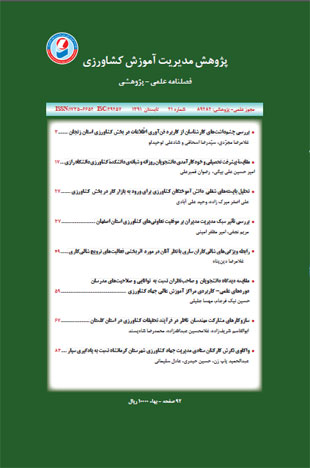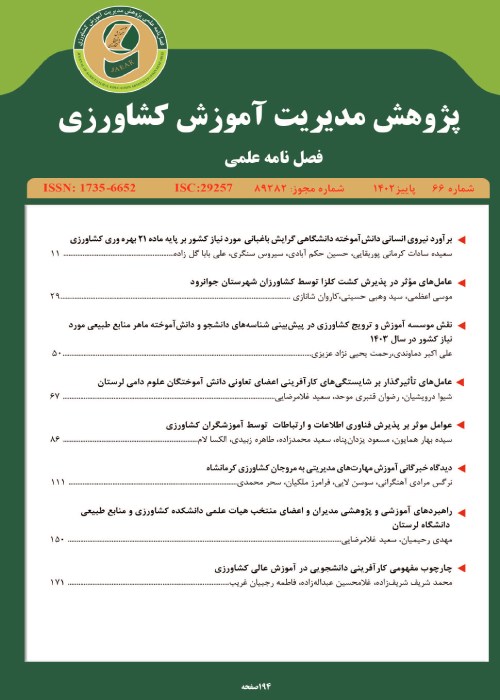فهرست مطالب

نشریه پژوهش مدیریت آموزش کشاورزی
سال چهارم شماره 21 (تابستان 1391)
- تاریخ انتشار: 1391/10/11
- تعداد عناوین: 8
-
-
Page 3This research was carried out to assess the application of information technology to meet the expectations of experts in agronomic subjects, horticultural affairs, water matters, food industries and agricultural extension in Zanjan province. The statistical population of the study consisted of 95 managerial active experts in agronomy, horticulture, irrigation, food industries and agricultural extension of Zanjan province Organization of Jihad-e- Agriculture that 80 persons of them were selected by random sampling. A questionnaire was used for data collection that validated by an academic group of agricultural extension and education experts. Its reliability was determined by Cronbach’s alpha that was up of 0.70 for measured indexes. The results showed that the application of information technology in agronomic subjects, horticultural affairs, water matters; food industries and agricultural extension were at moderate status while agricultural experts expected in all cases, too much use of information technology. The gaps between existing and desirable in all subjects studied were calculated based on the model of Berry et al. Based on research findings and In order to provide appropriate information to agricultural stakeholders was proposed the optimal use of information technology.Keywords: Information technology, expectation, IT application, agricultural Experts
-
Page 17Growing rate of public spending in higher education has forced the government to search for new ways of compensating the costs by introducing fee paid courses. After years of offering such courses، some authorities have started to disagree with the admission of fee paid students for the following reasons as their lower academic success، or their lower quality of teaching and learning compared to free students. Given the importance of selection and admission of talented students for studying agriculture towards the excellence of higher agricultural education system، the purpose of this descriptive study was to compare free and fee paid students of Razi University، Faculty of Agriculture regarding their level of academic achievement and self efficacy. The study population consisted of 3008 undergraduate students from the Faculty of Agriculture، Razi University. Using a stratified sampling method، 380 students were selected. The content validity of the research instrument was provided by a panel of experts. To determine the reliability of the instrument، Cronbach’s alpha coefficient was used. Findings showed that based on indicators of academic achievement and self-efficacy there was no significant difference between free and fee paid students.Keywords: Fee paid student, free student, academic achievement, self, efficacy
-
Page 27The main purpose of this research، that carried out as a survey، was to determin and analyz employment requirements for agricultural graduates to entre agricultural job market from the viewpoint of employers and managers of agricultural production units. Research population consisted of 100 employers in the agricultural sector including public، private and cooperative employers in Marivan، Kurdistan Province out of which 64 employers are studied as a sample. Research instrument was questionnaire that its validity was confirmed by content analysis method and its reliability was confirmed by calculating alpha coefficient (α= 0. 81). Results showed that in viewpoint of employers and managers of agricultural production units، relationship and processing competencies were more important on the employers of agricultural graduates in agricultural job market. to the growth and development of needed employment competencies by agricultural graduats، participatory planning and reviewing goals and curriculums in agricultural courses and emphasis on learning by doing methods in teaching، also change in contemporary teaching technique and methods and updating are proposed.Keywords: Extension education, employment competencies, professional development, agriculture job market
-
Page 37The general goal of this research was as sessment of the effect of managers’ management style in the success of agricultural cooperatives of Isfahan province. This research was an analytical research. Based on Chocran formulas multi-stage cluster sampling in three different agricultural cooperative (poultry and animal husbandry، horticulture، and others) of three different districts (flat، mountainous، and desert) 108 board of director members and executive managers out of 540 members were randomly selected. After completion of 30 pre-survey questionnaires، statistical tests (KMO and alpha coefficient) showed that the research instrument was valid and reliab to analyz dependencies among research variables، this research employed frequency distribution tables as well as path analysis. Research results showed that cooperatives have not been successful in satisfying their goals defined by the articles of association. Finally، results of path analysis showed that the success of cooperatives mostly relies on management style، and organizational training.Keywords: Agricultural cooperative, management style, cooperative's success
-
Page 49The purpose of this study was to investigate relationship of paddy farmers’ characteristics with their viewpoint toward the effectiveness of paddy extension activities. Statistical population consisted of 42117 paddies in Sari County. From that 346 were selected using stratified random sampling method. Methodological approach of this study was descriptive research. Validity of the instrument was established by a panel of experts consisting of senior faculty members in agricultural extension and education department of Shiraz and Sari University، and research committee advisors. Reliability analysis was conducted by using Cronbach’s alpha α=0/82. Results showed that 66. 5، 30. 3 and 3. 2 percent of farmers expressed that effectiveness of extension activities were very little and little، moderate and good respectively. Considering the mean of effectiveness of extension activities in Sari County during 2011، was low. Also، results from multiple regression analysis (stepwise method) revealed that variables social participation، age، ecological situation، benefit-cost ratio، income and the extent they used information sources، explained of 66. 4% of the variance of effectiveness of extension activities.Keywords: Effectiveness, extension activities, paddy farmers, social participation, information sources
-
Page 59The major goal of this research was to surveying agricultural scientific-applied from students and lecturers points of view in current and optimum position. This research، as an applied one، was done on the basis of descriptive-explanatory methodology. Participants were in two groups the first consisted of 1500 students in 12 Jihad -Agriculture Higher Education Institutes. The research sample was taken based on Krejsi and Morgan Sampling Table 280 as students. The Second consisted of 35 educational experts who surveyed. The reliability of the research tool was estimated by the Cronbach‘s alpha (α= 0/89). Research data were analyzed by Cronbach‘s alphaone-sample t-test and independent samples t-test statistics. Analysis of data of students ‘view revealed that the lecturers ‘competencies in cognitive and affective domain were close to average point and their skills were average. But، educational experts evaluated lecturers ‘competencies in cognitive and affective domain close to the average. They also evaluated the lecturers ‘competencies in skills over the projected point. Research findings also showed that the Jihad -Agriculture Higher Education Institutes ‘lecturers are not competent as they are expected.Keywords: competency lecturer, agricultural, cognitive domain
-
Page 67This survey research was conducted to identify and analysis appropriate mechanisms of participation and collaboration of Agricultural Consultant Engineers or Farm Advisors (ACEs) in agricultural research and technology development. The statistical population of this research consisted of all agricultural consultant engineers in Golestan Province (N=380). Using Cochran sampling formula and random sampling method، 105 agricultural consultant engineers were selected in order to fill a researcher-made questionnaire as research tool. Face and content validity of the questionnaire was established using a panel of agricultural extension experts and consultant engineers. A pilot test was conducted to determine the questionnaire’s reliability based on Cronbach’s alpha (that calculated for two parts were α1=0/74 and α2=0/86). Using SPSS، collected data analyzed applying explanatory factor analysis. Altogether، Factor analyzing of mechanisms of participation and collaboration of ACEs in agricultural research and technology development regarding two aspect (importance and feasibility) led to 9 extracted factors، as: contribution in organizing and implementing agricultural research، participation in planning agricultural research، coordination and setting up operational linkages، facilitating farmer research، communicating research findings، integrating extension and research، facilitating field and on-farm researches، need assessment، monitoring and evaluation of agricultural research، and information exchange in agricultural research process. Two groups of extracted factors explained 79% and 65% of the variances of analyzed mechanisms، respectively. Based on the findings، some mechanisms were suggested for participation and collaboration ofACEs in agricultural research and technology development.Keywords: Agricultural extension, agricultural research, research, extension linkage, agricultural consultant engineers
-
Page 83
M-Learning is a new stage of E-Learning development. Vast capabilities of mobile devices and learning possibilities، disregarding time and place، make it an important channel to continuing education. This survey study was conducted to investigate the attitude of Kermanshah Agricultural Jihad Management personnel regarding M-Learning. The research population included all 270 Kermanshah logistic Agricultural Jihad Management staff (N= 270). Morgan- Krejsi table was employed to data personnel as research sample (n= 161). Data were collected by questionnaire that for reliability Coronback alpha were employed (α= 0/83. 1). Some research result hove shown that staffs attitude for M- Learning is positive and according to correlation study، age and job experiences have a significant relation with MLearning. The result of Mann- Witni test showed significant relation between job position and respondents attitude. By using M- Learning، many opportunities have provided developing for agricultural adulation in rural areas and to lead these areas to distance and M- Learning.
Keywords: IT, electronic learning, mobil, learning


